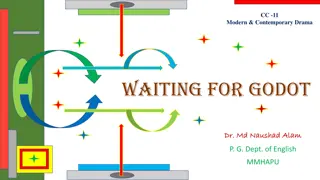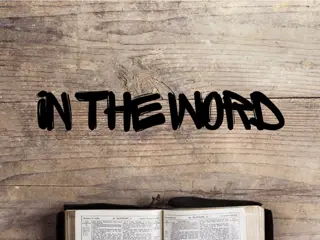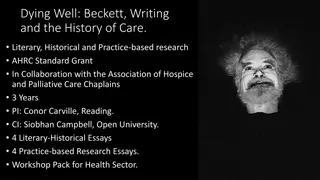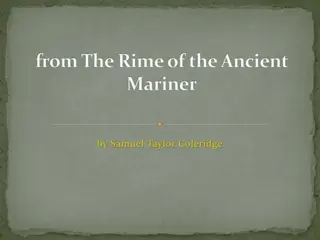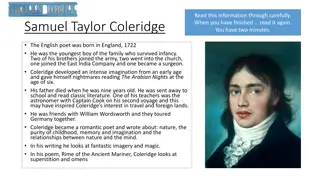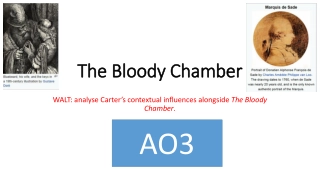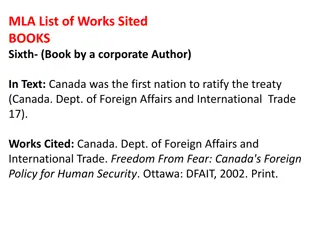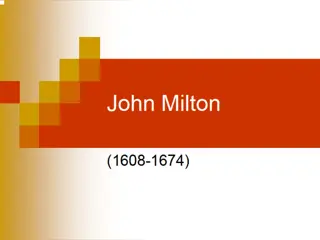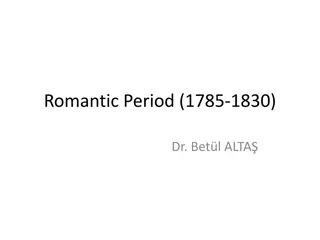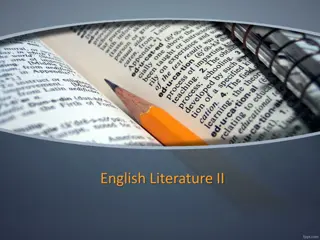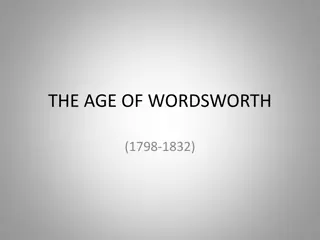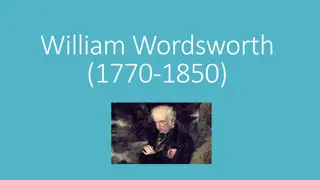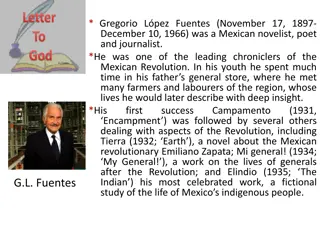The Life and Works of Samuel Beckett in "Waiting for Godot
Samuel Beckett, born in Dublin, Ireland in 1906, was a renowned writer known for his novels, short stories, and iconic plays like "Waiting for Godot." This tragicomedy masterpiece explores the human condition through themes of waiting and absurdity. Beckett's writing style, influenced by modernists like James Joyce, captivated audiences with its attention to detail and haphazardness. The characters in "Waiting for Godot," such as Vladimir, Estragon, Pozzo, Lucky, and the mysterious Godot, embody profound existential dilemmas. Beckett's legacy continues to inspire and intrigue readers and theatre enthusiasts worldwide.
Download Presentation

Please find below an Image/Link to download the presentation.
The content on the website is provided AS IS for your information and personal use only. It may not be sold, licensed, or shared on other websites without obtaining consent from the author. Download presentation by click this link. If you encounter any issues during the download, it is possible that the publisher has removed the file from their server.
E N D
Presentation Transcript
W A ITIN G FOR G OD OT -S A M U E L B E C K E TT
SAMUEL BECKETT Samuel Beckett was born on April 13, 1906, in Dublin, Ireland. During the 1930s and 1940s he wrote his first novels and short stories. He wrote a trilogy of novels in the 1950s as well as famous plays like Waiting for Godot . In 1969 he was awarded the Nobel Prize for Literature. In 1928, Samuel Beckett found a welcome home in Paris where he met and became a devoted student of James Joyce. On his journey, he came across many individuals who would inspire some of his most interesting characters. He died on December 22, 1989 in Paris, France.
WAITING FOR GODOT It was a tragic comedy in two acts. It is one of the masterpieces of absurdist literature. Waiting for Godot is written in 1948. It was first staged in a small theatre, Paris in 1953.since then it has been translated into many languages. Waiting for Godot is his first successful attempt at his kind of writing drama. Waiting for Godot does not tell us a story; it explores a static situation. The subject of the play is not only waiting for Godot its also the act of waiting for an essential and characteristic aspect of human condition.
INFLUENCE Beckett was attracted by the modernist s form and style, particularly impressed by Hugh Proust and James Joyce. He wrote admiringly of Joyce s Work in Progress. James Joyce Hugh Proust Waiting for Godot is Beckett s first successful attempt at this kind of writing in drama. For its haphazardness (random or unplanned),it conceived with a great deal of attention to detail. This result is an extraordinarily powerful play whose power derives precisely from its skilful blending of form and meaning and dramaturgic structure.
ESTRAGON Estragon called GOGO by Vladimir, is a man who is beaten every night. VLADIMIR Vladimir called DIDI by Estragon, is a man trying to sense of the world.
POZZO Pozzo is a pompous man who believes, he is in control. LUCKY Lucky is Pozzo s leashed and burdened slave.
A BOY A boy come twice (or perhaps two boys come, once each) as a messenger from Godot. . GODOT Godot is a possible stand-in for God, is the titular figure of the play, who never appears
Saviour A vindictive tyrant GODOT His various identity God A rich employer A vindictive tyrant Someone who has the tramp s future in his hand
(SYMMETRICAL STRUCTURE -WHICH ONE PART BALANCES ANOTHER) The entire play, as Ruby Cohn observes, is woven with repetition. Act two is a repetition of Act one. It employs two sets of characters and each set is a pair. The relationship between and within these pairs is not always one of identity and harmony but also contradiction and tension. This generates a pattern of binary oppositions. Ruby Cohn
ESTRAGON AND VLADIMIR Estragon and Vladimir are essentially Everymen, representing all of humanity, but they also contrast in some ways. Estragon is primarily concerned with feelings, particularly his own suffering, rather than intellectual thoughts, and he has trouble understanding much of Vladimir's logic and philosophy. If the two primary characters represent two parts of a person, Estragon is the body. The beatings Estragon says he receives represent the suffering that afflicts and traps humanity. Vladimir is the more logical and intellectual of the two primary characters. He is the only character who remembers most events from one day to another, and he works the hardest to fit those events into a logical time frame, despite conflicting evidence. He tries to explore philosophical ideas logically, but often misses deeper truths Estragon seems to grasp instinctively. If Estragon represents the body, Vladimir represents the mind, with all its ability to deceive itself.
Pozzo and Lucky In contrast to the other characters, Pozzo is a wealthy landowner with power and resources. He clearly sees Vladimir and Estragon as beneath him. His concern with appearances and social conventions is ridiculous, pointing out their meaninglessness. Pozzo uses his power over Lucky to abuse him horribly. But his power and resources are ultimately useless they don't give his life meaning or protect him from misfortune. When he becomes blind, he must rely on his slave, Lucky (who was previously merely a convenience and for entertainment) to help him navigate life, becoming pitiful in a single stroke of fate. As Pozzo's slave, he must constantly carry burdens that are not his own. His body is constrained, much like his free will. This might be why he seems not even to consider leaving when Pozzo becomes blind, losing most of the power he had wielded over Lucky. However, Lucky demonstrates some willpower during his long speech. He is upset by the prospect of Pozzo selling him, which suggests he may choose to remain in his role. There is a dependency between Lucky and Pozzo that seems related to, but not limited to, their inequality.
BINARY OPPOSITION A binary opposition (also a binary system) is a pair of related terms or concepts that are opposite in the meaning. Pattern of Binary Oppositions Each of two central characters in the play, i. Mutual love and care between Vladimir and Estragon. ii. Pozzo and Lucky physically tied together. iii. Even the Messenger boy has a brother. Examples: Estragon s immediate physical needs (hunger, sleep)are contrasted to Vladimir s optimism. Pozzo is domineering, bullying master, Lucky is a obedient slave. The boy who looks after the goats is treated well and his brother was beaten.
Waiting for Godot, achieved quick success at the small Theatre de Babylon putting Beckett in the international spotlight. The play ran for 400 performances and enjoyed critical praise. His works are filled with allusions to other writers such as Dante, Rene Descartes, and James Joyce. Beckett s plays are not written along traditional lines with conventional plot and time and place references. Instead, he focuses on essential elements of the human condition in dark humorous ways. This style of writing has been called Theater of the Absurd by Martin Esplin, referring to poetAlbert Camus concept of the absurd. Absurd drama is drama which takes the form of man s reaction to a world apparently without meaning or man as a puppet. It tells the reaction of people without destination and direction. It exists because of a philosophy that human is nothing and he will dead someday. The plays focus on human despair and the will to survive in a hopeless world that offers no help in understanding.
CONCLUSION; Samuel Beckett s Waiting for Godot is a masterpiece of Absurdist play. Almost nothing happens in the play, the action takes place on a stage presenting the post war era where the human existence becomes a challenging one. Some important aspects of this drama reveals some certain points about absurdity. Waiting for Godot, like most of Samuel Beckett's works, contains little in the way of historical context. He wanted his audience to experience the play without the expectations and assumptions attached to a particular people, place, or time. The play is not entirely free from cultural context, however, containing references to the Bible, Shakespeare, and ancient Greek mythology, as well as a number of allusions to Christianity.


